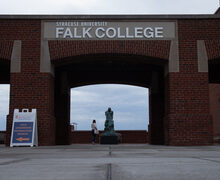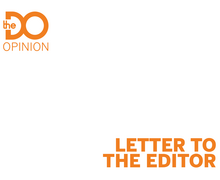Potter: Republican Party needs to change policies, connect with millennials
The stereotypical millennial is portrayed as a flannel-wearing, tattoo-getting, mustache-growing, BuzzFeed-reading, constantly texting type that is overwhelmingly liberal.
This stereotype is inaccurate and potentially offensive, but the GOP’s recent advertisements suggest that they believe it is the best vehicle to appeal to America’s youth.
The Republican Party recently attempted to increase its appeal to millennials with a new ad campaign featuring minorities and “hipsters.” The reoccurring star of these clips is Scott Greenberg, who appears to be the stereotypical hipster millennial, with wide-rimmed glasses and facial hair to spare.
These confessional-style ads feature mostly minorities, despite the fact that according to a Feb. 8 Gallup poll, 89 percent of Republicans are white. It remains unclear what percentage of millennials are indeed hipsters. The ads discuss concerns about energy policy, unemployment rates and government size in vague, ambiguous terms.
Scott, for example, is a Republican because he doesn’t “want to check his bank account before filling up his car” and therefore supports an “all of the above” energy policy. Unfortunately for the GOP, most millennials have the critical thinking ability to realize that there is more to energy policy than gas prices.
These ads, featuring the select few millennials that choose to endorse the GOP, are not representative of the political views of young people in America.
However desperate and poorly executed this attempt to increase millennial support of the GOP is, it shows that they are recognizing just how pivotal millennial votes will be to have a fighting chance in future elections. According to a March 17 article on PolicyMic, by 2020, millennials will make up 40 percent of the electorate.
Unfortunately for the Republican Party, millennials are more liberal than any previous generation of youth, according to a March 12 Los Angeles Times article.
Considering the fact that in 2013 only four Republicans in Congress supported gay marriage, it is blatantly obvious that in order to remain relevant, the agenda of the GOP needs to be adjusted to include socially liberal values.
Fifty-five percent of millennials believe that illegal immigrants should be granted a pathway to citizenship and 68 percent consider themselves supporters of gay marriage.
There is an enormous age gap in voting between generations. According to a March 7 Pew poll, 60 percent of those who are 18–29 years old voted for Obama in 2012 and 44 percent of the 65-plus age group voted for Obama in 2012.
In light of these statistics that overwhelmingly suggest the millennials are socially liberal and tend to vote Democrat, it is essential that Republicans accept this growing wave of change. They are clinging to socially conservative values that are outdated.
It is apparent that the agenda of the Republican Party does not match the beliefs of millennials. Unless its agenda changes to fit what will soon make up one of the largest voting demographics, the Republican Party will literally age out of American politics.
This is not to say that the economically conservative values of the Republican Party will become irrelevant. Frankly, economic compromises between the parties are essential to the prosperity of the United States. It is critical that multiple perspectives be considered and that both conservative and liberal economic ideology is present in political discourse.
In fact, millennials are increasingly identifying as Independents. This suggests that they are undecided politically and could be swayed either direction. As of now they overwhelmingly tend to vote liberally, but this likely hinges on the outdated social views of the GOP.
This recent ad campaign will not help save the GOP from its inevitable defeat at the hands of millennial voters. At least, not until they offer outright support of gay marriage, become sensitive to the agenda of minorities and liberalize their social agenda.
Rachel Potter is a junior political science and sociology major. Her column appears weekly. She can be reached at [email protected].
Published on April 2, 2014 at 1:01 am




